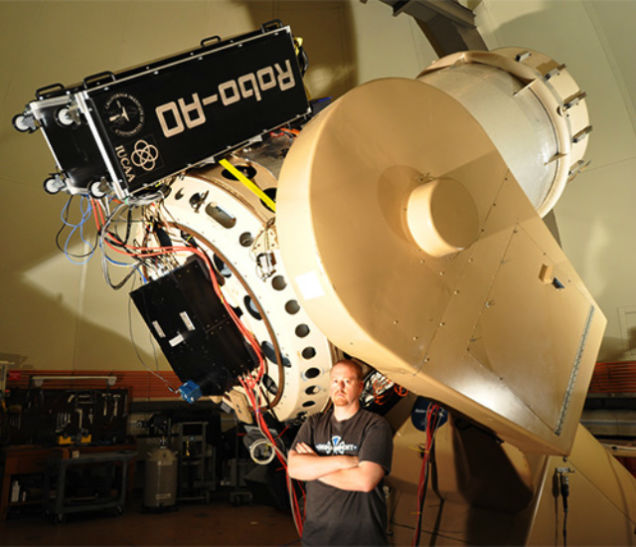As Earth’s own atmosphere makes far-away solar systems and planets harder to see, hunting for a planet that might be similar to our own—an exoplanet with a terrestrial landscape—is challenging, even with the advances we’ve made in adaptive optic technology. Which is why the team that’s just invented the world’s first fully autonomous, fully robotic telescope is so excited: the system’s technology is ten times faster than any existing optic system, enabling it lock onto its target in a flash.

Developed by a team of researchers from all around the globe, the Robo-AO is a fully autonomous system, with adaptive optic technology and an imaging system that enables it to lock onto its targets in just about 60 seconds. As previous systems took at least ten minutes to lock onto their targets, the world’s first fully robotic telescope has made quite a leap forward.
The system can be attached to any ground-based telescope , one to three meter class, and can deliver images that are as sharp and clear as those captured by the Hubble Space Telescope. The Robo-AO system has already been attached to the 60-inch telescope at the Palomor Observatory, where it conducted the largest adaptive optics survery ever: the system was able to observe 715 Kepler candidate planets in that single session.
“The automation of laser adaptive optics has allowed us to tackle scientific questions that were unimaginable just a few years ago. We can now observe tens of thousands of objects at Hubble-Space-Telescope-like resolution in short periods of time,” said University of Hawaii affiliate Dr. Christoph Baranec, in a press statement. “Now that the technology has been proven, we're looking to bring it to the pristine skies of Maunakea, Hawaii, where it will be even more powerful.”
The Robo-AO team is currently raising funds to build a second unit, which will no doubt be helpful when it comes to investigating the 4,000 or so potential exoplanets they have waiting—to say nothing of anything that’s discovered in the upcoming Kepler K2 mission.
Source Gizmodo
Advertisement





